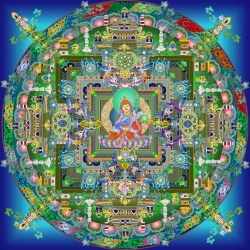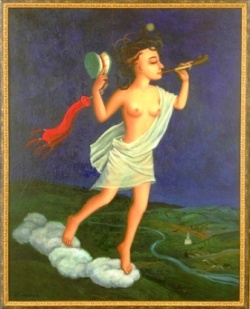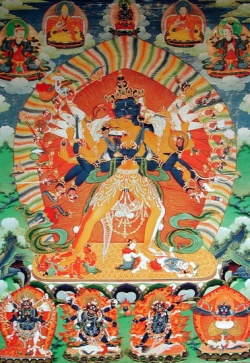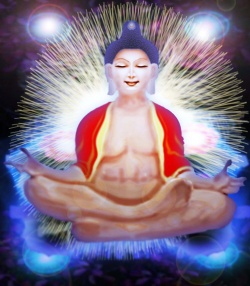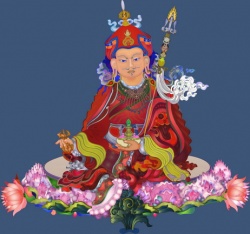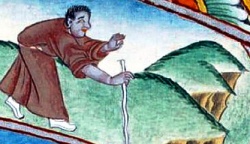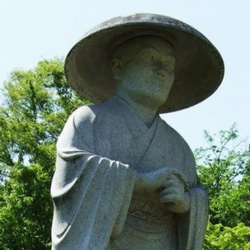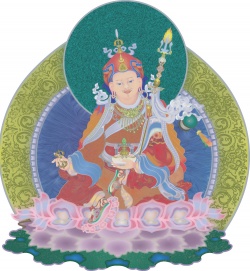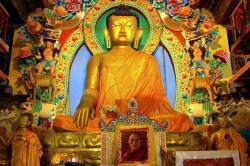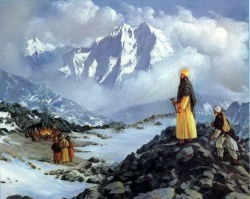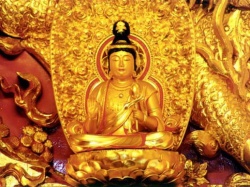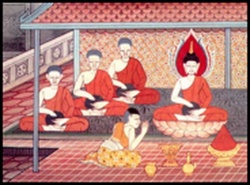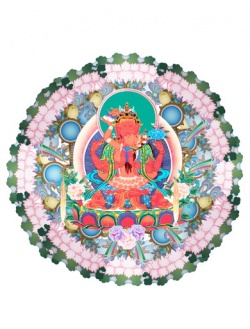Sariputta
Sàriputta (Pali), Sariputra (Sanskrit) was one of the Buddha’s two chief disciples. He and his childhood friend Moggallana both became monks together under the teacher Sanjaya but eventually became disillusioned with him and his philosophy and then split up and went their separate ways looking for a better teacher.
One day Sàriputta heard about the Buddha’s Dhamma, converted and straight away went in search of his friend to tell him of the wonderful teaching he had discovered. When they met and Moggallàna heard the Dhamma, he too converted and then the two young men went to find the Buddha so they could be ordained as monks by him. In time the Buddha came to look upon Sàriputta and Moggallàna as his chief disciples and heirs.
Sàriputta’s forte was his ability to understand the most abstruse aspects of the Dhamma and expound it in a clear and comprehensible manner, so much so that the Buddha gave him the title of ‘General of the Dhamma.’ In one of his discourses he spoke of the qualities needed to be a good Dhamma teacher, qualities he himself possessed. ‘When one teaches another he should first establish five things within himself and then teach. What five? Let him think; “I will speak at the right time, not at the wrong time. I will speak about what is, not about what is not. I will speak with gentleness, not harshness. I will speak about the goal, not about what is not the goal. I will speak with a mind filled with love, not with a mind filled with ill-will.” First establish these five things and then teach another’ (A.III,195). This is one of a number of discourses by Sàriputta preserved in the Tipitaka. In Sri Lankan, Thai and Chinese temples the main statue of the Buddha is often flanked by two smaller statues, one of Sàriputta and the other of Moggallàna.
The two most prominent disciples of the Buddha were Moggallana and Sariputta. They are called the Dhamma-Senapati-s (Commander-in-Chief of the Buddhist dharma). Sariputta is also called the “chief disciple (aggasavaka) of the Buddha.” His real name was Upatissa, yet he was called Sariputta in the Buddhist tradition because he was the son (putta) of Rupasari, a Brahmin woman of the Nalaka village. He is particularly known for the firmity of his vow; and strong determination. He was also entrusted with the ordination of Rahula, the son of Gotama. He was the first on the earth to have received the teachings of Abhidhamma – the kernel or the essentials of the Buddhist doctrine - on this earth; and the only one among the human beings to have learn t the same directly from the Buddha. He was, therefore, the first acharya to have carried forward the lamp of Abhidhamma on the planet; and thus to initiate the acharya-disciple tradition, which in turn was perpetuated in the like manner through Bhaddaji, Sobhita, Piyajali, Piyapala, Piyadassi, Kosiyaputta, Siggava, Sandeha, Moggalliputta, Sudatta, Dhammiya, Dasaka, Sonaka and Revata; and then through Mahinda, Ittiya, Sambala, Pandita, and Bhaddanama it reached Sri Lanka. Interestingly, this tradition is still alive in Sri Lanka, Myanmar, and Thailand; though withered away in India, Pakistan, Bangladesh and Cambodia.
When the Buddha taught the Abhidhamma to his mother in Tavatimsa loka by sitting on the Sakka’s throne under the Paricchataka tree; he would then descend to the lake Anottapa every day to teach the same to Sariputta for three months by creating his own form (the Nimmitta Buddha) there. So, Sariputta became the first among the monks to have learnt Abhidhamma - “the doctrine of all-that-is-within-and-without”. Sariputta, in turn, then taught it to his five hundred disciples every day. Thus, when the Buddha concluded his sermons in Tavatimsa the seven books of the Abhidhamma Pitaka, too, were compiled by the following day.
An interesting story is related to Sariputta and a yakkha (Sanskrit: yaksa; spirit). Once at night when Sariputta was deeply engrossed in meditation with his shaven head a yakkha, flying in the sky saw the shining head of Sariputta in the moonlit night. Tempted at the sight, he dealt a powerful blow on the monk’s head. The blow was powerful enough to crumble a mountain. Yet, that did not inflict any damaging effect on the monk except to that he felt a mild headache after the completion of his meditation.
According to the Pali Jatakas Sariputta was born as Krishna (Kanha) in one of his births. Furthermore, his characters in the Jatakas are numerous. He died a fortnight before Moggallana’s death.
Note: It is noteworthy that in the Pali tradition Sariputta was born as Kanha (Krishna) in one of his births (contrary to the belief that the Bodhisatta was born as Krishna). The Bodhisatta was, however, born as a great sage Kanha Dipayana during those days, and it was due to his curse that the lineage of the Vasudeva was eventually destroyed.
See Ghata Jataka No.454.
As a second Kanha he was born as a great ascetic with the name Kanha Tapassa (Kanha Jataka No.440).
Further, it is interesting to note that the Pali tradition, too, admits that the Buddha was once born as a great monarch with the name Rama Pandita in one of his births and had lived for twenty-thousand years.
See [[Dasaratha[Jataka]] No.461.
Sariputta was the first (right) chief disciple of the Buddha and foremost in wisdom. His special task was the detailed analysis and systematization of the doctrine. Because of his deep insight of the ultimate Truth he was responsible for drawing out the subtle implications of the Dhamma and for explaining the meaning of complex teachings.
In addition to his wisdom, Sariputta was well-known for his patience, compassion, humility and helpfulness to others. Not only did he help the community and the monks in the Dhamma, but he also provided material help and comfort. When the monks left for their alms round early in the morning Sariputta did not join them. Instead, he stayed in the monastery and made sure that everything was in order. If one of the novice monks had forgotten to sweep out a room or if any item was disarranged Sariputta put it in place and swept the premises. He wanted to ensure that the monastery should at all times be in order so that visiting devotees would not have a negative impression of the Order.
Sariputta’s Caring
He then visited the sick hall and provided comfort and medicine for the monks who were sick. Tending a sick monk named Tissa that everyone had rejected, the Buddha had said, "Those that tend the sick tend me (follow my teachings)." Sariputta, reminding the monks of this, encouraged the novice monks to help with the caring and comforting of the sick. If any of them required medicine that was not available on site, he arranged for it to be obtained. It was only after such duties were taken care of that Sariputta went on his alms round.
There are many documented instances of Sariputta’s ministering to the sick. His instruction and comfort to Anathapindika are noteworthy. Sariputta helped Anathapindika on two occasions. The first was when he was sick and in excruciating pain. Sariputta had reminded Anathapindika that he was a Sotapanna and as such on the path to enlightenment. He could not fall away from the Dhamma or obtain rebirth in one of the unhappy plains. These words relaxed Anathapindika’s mind and gave him great happiness. The excruciating pain disappeared. So grateful was Anathapindika to Sariputta that he offered him the rich meal that had been prepared by his servants to tempt him to eat.
The second instance was at Anathapindika’s deathbed. Anathapindika, who had a lot of confidence in Sariputta and respect for him had requested his presence ‘out of compassion for him’. Sariputta, accompanied by Ananda, had come and given an inspiring sermon on non-attachment. Anathapindika was moved to tears by the profound discourse, the likes of which he had never heard before. Shortly after, Anathapindika died and was reborn in the Tusita heaven as a Deva. That night he came in splendor to Jetavana to praise the glory of the chief disciple. Saluting the Buddha, he said:
"Sariputta truly is endowed with wisdom
With virtue and with inner peace,
Even a monk that has gone beyond
At best can only equal him."
The next morning the Buddha told His monks of His visitor and what he had said, without identifying the Deva. Ananda immediately identified Anathapindika correctly by saying that the Deva must be Anathapindika, reborn as a Deva, as he had great respect for and confidence in Sariputta.
Sariputta’s Humility
Sariputta’s humility is also documented in the text. When traveling with the Buddha he did not feel that as the first chief disciple his place should be next to the Buddha. Instead, he trailed behind, helping the sick and infirm monks who usually lagged behind. In fact, because of his immense compassion and caring, on one such instance Sariputta was the last to arrive. As all the good accommodation had been taken, Sariputta slept in a tent made of robes. When this was brought to the Buddha’s attention He said that accommodation should be arranged based on seniority in the order and dispensed the Tittira Jataka, where in a previous birth the Buddha and His chief disciples had similarly decided that the three of them would pay homage and obeisance to the most senior member.
On another occasion a seven-year-old novice monk brought to Sariputta’s attention the fact that his inner robe dragged below his outer robe. Moving aside, Sariputta adjusted his robe, then saluted the young monk and asked, "Now is it correct, teacher?" The Milindapanha documents Sariputta’s account of this incident as follows:
"If one who has gone forth this day, at age seven
Should teach me, I accept it with lowered head;
At sight of him I show my zeal and respect:
May I always set him in the teacher’s place."
Sariputta’s respect for his teacher Assaji who first taught him the Dhamma is an example that all should follow. Each night before sleeping Sariputta would pay obeisance to the Buddha. Then he would look around, prostrate himself and worship a direction. Observing this, the monks informed the Buddha that Sariputta had taken to worshiping the different directions (north, south, east and west). The Buddha corrected their assumption by saying that each night Sariputta looked with his divine eye to see in which direction his first teacher, Assaji, was residing. Then, after paying obeisance to him, he slept placing his head in that direction, careful to ensure that his feet were not in the direction in which Assaji was residing.
The honoring of one’s teachers is an integral part of the Buddha’s teaching. The Nava Sutta instructs that one should honor one’s teacher, especially those who teach the nectar of the Dhamma. The Sutta starts as follows:
"As the Devas pay devout homage to Indra1,
So should one revere the person
Through whom one has learnt the Dhamma."
Sariputta’s Patience
Sariputta’s patience and forbearance are also legendary. A group of men were praising the noble qualities of the elder when a young Brahmin challenged them saying that the reason Sariputta had never shown anger was because he had never been provoked. To prove that Sariputta, like others, would resort to anger, he walked up behind the elder and dealt him a resounding blow. Sariputta said ‘What was that?’ and then, without even turning around to find out who had hit him, continued walking. The Brahmin was overcome with guilt and shame at his conduct. Falling on his knees he begged pardon and told Sariputta how he had hit him to provoke anger. Sariputta then forgave the Brahmin. The Brahmin, not satisfied with a verbal pardon, asked Sariputta to come to his home for the noonday meal to show that he bore no malice towards him. Sariputta accepted the invitation.
After the meal, as Sariputta was leaving, he saw that a mob of angry supporters had gathered with sticks and stones to punish the Brahmin. They had witnessed the Brahmin’s treatment of the elder whom they loved and respected. Sariputta asked them what the commotion was about. When informed he asked, ‘Whom did the Brahmin strike, you or me?" On being told that it was the Elder whom the Brahmin had struck he dispersed the angry crowd by saying, "I have pardoned him. What cause is there for anger when I whom he struck feel none."
Sariputta’s caring, compassion and humility won him many friends. He was the chief disciple of the Buddha, second in wisdom to the Buddha. But he was humble, caring and compassionate. He also did not in any way use his position for special treatment. In addition to his close friendship with Moggallana, his childhood friend, he had a close relationship with Ananda, the Buddha’s personal attendant.
Sariputta, who felt that as Chief disciple he should be attending to the needs of the Buddha, was deeply grateful for the respect, care and attention that Ananda lavished on the Buddha. In turn, Ananda was deeply respectful of the chief disciple of the Buddha who helped to administer and train the Buddha’s large following. When Ananda gave ordination to novice monks he took them to Sariputta for higher ordination. Similarly when Sariputta gave ordination to novice monks he took them to Ananda for higher ordination. In this way the two great elders shared a large congregation of monks.
Ananda also, with the Buddha’s permission, often kept choice robes that he received for Sariputta. In the same manner, Sariputta passed on to Ananda choice offerings that had been made to him. Once Ananda received a very expensive robe from a wealthy Brahmin and, with the Buddha’s permission, kept it for ten days for Sariputta’s return. The other monks commented on this deep friendship, saying, "We can understand Ananda, who has not as yet attained Arahanthship, feeling such deep affection for Sariputta, but how is it that Sariputta, who is free of taints, should reciprocate?" The answer, of course, was that Sariputta’s attachment was not a worldly attachment but a love and respect for Ananda’s virtues. It is also because Arahanths have not eradicated samsaric virtues (vasana gune). It is only the Buddha who has eradicated vasana gune.
Sariputta must have been a stimulating companian for he was sought after by many. What attracted people to him was his deep caring for others, his enormous patience and his exemplary behaviour. When Sariputta entered the meditative stage on the void, even the Devas came to pay homage to him. The following is Maha Kassapa’s praise of the elder:
"These many Devas, powerful and glorious,
Ten thousand (Devas), from Brahma’s company,
Stand with joined hands worshiping him,
Sariputta, wise marshal of the Dhamma,
The great meditator in concentration.
"Homage to you, O thoroughbred man,
Homage to you, O supreme man..."
-- ( Theragatha 1082-1084)
Despite the fact that he had a large following and was well-respected, Sariputta had difficulties convincing his mother, Rupasari, of the Truth, as she had been taught from birth the doctrine of the Brahmins. Sariputta had three brothers, Cunda, Upasena and Revata, and three sisters, Cala, Upacala and Sisupacala. All six took ordination under the Buddha and attained Arahanthship. Cunda was in later years Sariputta’s attendant. Despite the fact that Rupasari had such distinguished children in the Order, she herself was a non-believer, deeply set in Brahmin rites and rituals. In fact, she had not wanted her youngest son, Revata, to be ordained, and had planned a marriage for him at a very young age to prevent him from entering the order. However, on his wedding day, when Revata viewed the very old grandmother of his bride-to-be, he became disillusioned and, realizing the impermanence of all things, ran away from the wedding to the monastery to be ordained. His three sisters married, but gave up the household life and became nuns. Their children too entered the order.
None of her children or grandchildren, however, could influence Rupasari. When Sariputta visited the city of his birth with a large gathering of monks, he came to his mother’s house for alms. His mother, whilst offering them food, insulted him in front of all the monks by berating him. She said, "O you, eater of others’ leavings. When you fail to get food you go from house to house among strangers, licking the leavings from the back of their ladles. And so it was for this that you gave up eighty crores of wealth. You have ruined me. Now go on and eat." She then went on to berate the monks for having her younger son as an attendant by saying, "So you are the men who have made my younger son your page boy". Sariputta, however, did not say a word. He took his food in silence and returned to the monastery.
Rahula, who had been among the retinue of monks, related this incident to the Buddha. Thereupon the Buddha praised Sariputta in front of the assembly of monks by saying:
"He that is free from anger,
Who performs his duties faithfully,
He that guards the precepts and is free from lust,
He that has subdued himself,
He that wears his last body -
He it is I call a Brahmin (Arahanth).
-- (Dhammapada 400)
We can all learn from Sariputta’s great patience, forbearance and humility. The Buddha has instructed us on the respect we should have for our mothers. Sariputta’s exemplary behaviour is one that we should all follow.
Sariputta’s Enlightenment
Sariputta attained supreme knowledge whilst listening to a discourse that the Buddha was addressing to Dighanakha, Sariputta’s nephew. The Buddha was teaching the comprehension of feeling and began by explaining the nature of the body. He then asked Dighanakha to contemplate the body so that desire and concern for the body should be abandoned. He then went on to explain the impermanence of all feeling and the doctrine of dependent arising. Sariputta, who was fanning the Buddha, listened to the discourse and describes his attainment of Arahanthship as follows:
"The Blessed One, The Buddha, The One with Vision,
Was teaching the Dhamma to another.
Whilst the Dhamma was being taught,
I lent an ear keen on the goal.
That listening of mine was not in vain,
For I am released free from cankers."
-- (Theragatha 995-996)
The Buddha repeatedly praised and reinforced Sariputta’s administration and handling of the monks. There is, however, one occasion on which the Buddha mildly admonished Sariputta. Sariputta had taught the Brahmin Dhananjani at his deathbed and ensured rebirth in a Brahma realm by teaching him about the four Brahma Vihara: Metta (loving-kindness), Karuna (compassion), Mudita (sympathetic joy) and Upekkha (equanimity). The Buddha questioned him as to why he had not taught Dhananjani further and helped him to destroy all cankers and attain Nibbana. Sariputta, unlike the Buddha, did not have the ability to know the spiritual capabilities of a person. As Dhananjani was a Brahmin he had ensured that his goal, which was birth in the Brahma realm, was met. The Buddha explained that as a result Dhananjani would need to obtain birth again in the human realm to achieve Arahanthship. This shows that rebirth, even in a Brahma realm, is not desirable, as one who has not attained Sotapanna could in a subsequent birth perform an unwholesome deed that could lead to rebirth in an unhappy realm. The Buddha had seen that Dhananjani would have been capable of attaining Arahanthship with some well-directed instruction.
Sariputta’s Last Days
When Sariputta’s life was nearing its end he decided that it was time to convince his mother of the Truth and place her on the Buddha’s Path. Sariputta knew that he had to first open her mind so that she would be receptive to the Buddha’s Teaching. He also knew that the only way that could be done was by shaking the confidence she had in Maha Brahma. Knowing that the Brahmas, including Maha Brahma, had great regard for him, he decided to go to his birthplace to pass away on the same bed in which he had been born. But first he had to take leave of the Buddha. With his retinue of monks he visited the Buddha and saluted Him respectfully. He then said:
"Lord of the world, O Great Sage,
I soon shall be released from life,
Going and coming shall be no more.
This is the last time I worship you,
Short is the life that now remains in me
But seven days from now I shall lay
This body down, throwing the burden off.
Grant it, O Master! Give permission, Lord!
At last the time has come for my Nibbana
Now I have relinquished the will to live.
The Buddha then asked Sariputta where he would attain final Nibbana. Sariputta replied that it would be in the Magadha country, in the village named Nalaka (Upatissa). The Buddha then asked Sariputta to dispense the Dhamma to his younger and elder brothers, as they would no longer have the opportunity to see a Bhikkhu like him.
The great elder then gave a discourse in which he displayed all his wondrous powers. Rising to the loftiest height of truth descending to mundane truth, rising again and again, he expounded the Dhamma directly and with similes.
He then worshiped the feet of the Buddha, embraced them and said: "So that I may worship at these feet I fulfilled the perfections throughout an incalculable period and one hundred thousand world cycles. My heart’s wish has found fulfillment. From now on there will be no more contact and feeling. Soon I will enter the City of Nibbana the unaging, peaceful, blissful and secure, which has been attained by many hundreds of thousands of Buddhas. If any deed or words of mine did not please you, O Lord, may the Blessed One forgive me. It is now time for me to go."
The Buddha then forgave Sariputta by saying, "There is nothing either by deed or words that I have to reproach you, Sariputta, for you are learned, of great wisdom, of broad and bright wisdom, of quick, keen and penetrative wisdom."
Immediately after the Buddha gave permission for Sariputta to attain Nibbana the great Earth shook and the skies tore open with a deluge of rain as if the very heavens were crying for the passing away of the great elder. The Buddha then rose and went to His perfumed chamber. Three times Sariputta circumambulated the chamber and paid reverence, and said: "It was one incalculable period and one hundred thousand world cycles ago that I prostrated myself at the feet of the Anomadassi Buddha and made the aspiration to see you. This aspiration has now been fulfilled and I have seen you. At the first meeting it was my first sighting of you. This is my last. There will be none in the future." And with raised hands joined in salutation, he reverenced the Buddha and walked backwards until the Blessed One was out of sight.
The Blessed One then addressed the Bhikkhus who surrounded Him and asked them to accompany Sariputta on his last journey. At His words all four assemblies at Jetavana left the Master alone and accompanied the great elder. The citizens of Savatthi also joined in with incense and fragrant flowers. A multitude of weeping and lamenting devotees followed the elder. Sariputta then addressed the devotees and reminded them of the impermanence of all things. "Have I not, he said, taught you of the impermanence of all near and dear to us"? He then asked everyone to go back to Savatthi, as the Master was alone and should not be left unattended.
Accompanied by a retinue of five hundred monks whom he himself had ordained, Sariputta set off for his birthplace. It took them a week to travel to Nalaka and on the way he spent one night in each of the different cities, teaching the Dhamma with compassion to the devotees for the last time. Upon entering the city of his birth he sent a message through his nephew informing his mother that he and his retinue would be staying with her for a day, and asking her to prepare his birth chamber and residence for his 500 monks.
He then walked slowly to his childhood home. Rupasari was perplexed at her son’s appearance. "I wonder," she thought, "if he has realized the error of his thinking in leaving all his wealth. Perhaps in his old age he has grown wiser and has come back to reclaim his wealth." She then went about preparing for her son and his retinue.
Sariputta approached his mother’s house and entered the bedchamber where he had been born. But he was now in great pain and very sick with dysentery. He lay down to rest whilst his brother, the novice Cunda, attended to his needs.
The four leading Devas of the Catumaharajika Heaven, seeing that the Marshall of the Dhamma was about to pass away, descended in all Their radiance to pay obeisance to the Venerable elder. Shortly after, Sakka, the king of the Tavatimsa Heaven, illuminated the whole area and descended to earth, and kneeling before the elder, paid obeisance to the Venerable One. Finally, Maha Bahama, in His full radiance, descended to earth to pay His last respects and catch a last glimpse of the elder.
Rupasari approached her son and questioned him on his visitors. "Who were the four radiant beings", she asked, "who paid obeisance to you?" Sariputta replied, "The four great divine kings, upasika." "Are you then greater than them?" asked his mother. "They are like temple attendants", replied Sariputta. "Ever since our Master took rebirth they have been standing guard over Him, swords in hand."
His mother then questioned him on his next visitor who surpassed the four kings in radiance. "That", said Sariputta, "is Sakka, the king of the Devas." "Are you then greater than the king of the Devas, dear?" asked his mother. "He is like a novice who carries a Bhikkhu’s belongings," replied Sariputta. "When our Master returns from the Tavatimasa Heaven, Sakka takes His bowl and extra robe and descends to earth with Him."
"And when Sakka had gone" asked his mother, "who was it who descended to your room, filling the room with his radiance?" "That," replied Sariputta, "is your Maha Brahma. The lord and master to whom you have been paying obeisance." "Are you then greater than my lord Maha Brahma?" asked his mother.
"Yes, Upasika," replied Sariputta, "on the day our master was born it is said that Maha Brahma received the Great Being in a golden net."
Upon hearing this the Brahmin woman thought, "How great must be the power and goodness of my son’s Master," and she was suffused with happiness, joy and confidence in the Exalted One.
Sariputta, seeing that his mother was now ready to receive the teachings of the Buddha, explained to her the Dhamma based on the virtues of the Buddha. At the end of the discourse his mother attained the first stage of sainthood, Sotapanna. Enjoying the bliss of Sotapanna, she then asked him why during all these years he had not bestowed the ambrosia of the knowledge of the deathless on her. Sariputta realized that his end was imminent. Seeing that his mother was now on the Path to Emancipation, and that she would not fall away from the Path, Sariputta requested the presence of his retinue of monks.
When the monks had assembled he asked Cunda to help him to a sitting position. And addressing the monks, he said, "For forty-five years I have lived and traveled with you. If by deed or word I caused you pain, forgive me, brethren."
And the monks replied that he had never given any cause for displeasure or pain and in turn asked Sariputta for forgiveness for any wrong they may have done. Then the elder, pulling his robe around him, lay on his right side and entered into the nine successive attainments of meditation in forward and reverse order, then passed through the four absorptions, and just as the crest of the sun was rising, at early dawn passed away to final Nibbana.
Next morning when his mother found that he had passed away she lamented at the missed opportunity to perform meritorious deeds for her son. And thus lamenting and crying at her own former folly spent the morning, for even as a Sotapanna she still had not eradicated all attachments.
After a week of ceremonies and homage a funeral pyre was built of sandalwood with rich arches of gold to cremate the elder. News of the elder’s death spread and people from all over came to pay homage and their last respects to the Marshal of the Dhamma. Throughout the night the devotees listened to discourses of the Dhamma until finally Venerable Anuruddha extinguished the glowing embers with scented water and, using a filter cloth, sifted the relics of the elder.
When Cunda, Sariputta’s attendant, informed Ananda that Sariputta had passed away and handed him his master’s robe and bowl, Ananda became weak and pale with grief over his friend. He addressed the Buddha and said, "Lord, the novice Cunda has told me that Sariputta has passed away. Then, Lord, my own body became weak as a creeper; everything around me became dim and things were no longer clear to me..."
The Buddha then questioned Ananda as to how this could be, as Sariputta had not taken any of Ananda’s knowledge or virtue with him when he passed away. The Buddha then reminded Ananda of impermanence and of the fact that He had taught him that all near and dear to us would eventually pass away.
Sariputta’s Contribution
Sariputta’s enormous contribution as the Marshal of the Dhamma can be understood by his description of his attainment of the supreme knowledge and the Buddha’s praise of the elder. Sariputta said:
"It was half a month after my ordination, friends, that I realized in all their parts and details,
the analytical knowledge of meaning,
the analytical knowledge of the doctrine,
the analytical knowledge of language,
the analytical knowledge of perspicacity.
These I expound in many ways, teach them and make them known, establish and reveal them, explain and clarify them. If anyone has any doubt or uncertainty, he may ask me and I shall explain the matter." (Anguttara Nikaya)
Sariputta, with this fourfold analytical knowledge, not only excelled in understanding the Dhamma, but also in teaching it so that others could understand. Because of his excellence in the Anupada Sutta, the Buddha declared him to be a true spiritual son and His chief assistant in "turning the Wheel of the Dhamma". The Buddha said:
"If one could ever say rightly of one that he has come to mastery and perfection in noble virtue, noble concentration, noble wisdom and noble liberation, it is of Sariputta that one could thus rightly declare.
If one could ever say rightly of one that he is the Blessed One’s true son, born of His speech, born of the Dhamma, formed of the Dhamma, heir to the Dhamma (not heir to worldly benefit), it is of Sariputta that one could thus rightly declare.
After me, O monks, Sariputta rightly turns the Supreme Wheel of the Dhamma even as I have turned it."
There are many discourses and books attributed to Sariputta which form a comprehensive body of the Buddha’s teaching. Sariputta understood in a unique way how to organize and present the rich and deep Dhamma in a lucid manner that was intellectually stimulating and inspirational. He was also responsible for the codification of the Abhidhamma that the Buddha taught in the Tavatimsa heaven to the Devas. Each day the Buddha would come back to earth to partake of His alms food and then would transmit this knowledge to Sariputta. Thus the giving of the method of the Higher Teachings was to the chief disciple who was endowed with the analytical knowledge, who then passed it on to the monks.
The Buddha’s high regard for Sariputta is seen again and again. In one instance the Buddha compared Sariputta to a crown prince as follows:
"If he is endowed with five qualities, O monks, the eldest son of a world monarch righteously turns the wheel of sovereignty that has been turned by his father. And the wheel of sovereignty cannot be overturned by any hostile human being. What are the five qualities? The eldest son of a world monarch knows what is beneficial, knows the law, knows the right measure, knows the right time and knows the society (with which he has to deal).
Similarly, O monks, is Sariputta endowed with five qualities and rightly turns the Supreme Wheel of the Dhamma, even as I have turned it. And the Wheel of the Dhamma cannot be overturned by ascetics or priests, by deities or Brahma, nor by anyone else in the world. What are those five qualities? Sariputta, O monks, knows what is beneficial, knows the Dhamma, knows the right measures, knows the right time and knows the assembly (he is to address)."
Sariputta encouraged those in the Noble Order by his wisdom and gentle ways. He said:
"Of restrained conduct, full of mindfulness,
Like a mindful one meditating with restrained intentions,
Vigilant, delighting in inward things,
With self well-concentrated,
Alone, content, him they call a Bhikkhu.
Whether eating moist or dried food,
He should be satisfied;
A Bhikkhu should wander with unfilled belly,
Eating in moderation, mindful.
Leaving four or five mouthfuls,
He should drink water;
This is sufficient for the abiding in comfort
Of a resolute Bhikkhu.
If he covers himself in the proper robe,
Which is for this purpose,
This is sufficient for the abiding in comfort
Of a resolute Bhikkhu.
Just as a rocky mountain is unmoving,
Well-founded, so a Bhikkhu,
Like a mountain does not tremble,
After the annihilation of delusion.
To a man who is without sin,
Always seeking purity,
A hair’s tip measure of evil seems
As if the size of a cloud.
I do not long for death,
I do not long for life,
I shall lay down this body attentive
And mindful.
As a frontier city is guarded inside and out
So you should guard yourselves.
Let not the opportunity pass you by,
For those who have missed the opportunity
Grieve when consigned to hell.
Calm, quiet, speaking in moderation,Calm, quiet, speaking in moderation,Calm, quiet, speaking in moderation,Calm, quiet, speaking in moderation,Calm, quiet, speaking in moderation,Calm, quiet, speaking in moderation,Calm, quiet, speaking in moderation,Calm, quiet, speaking in moderation,
Not conceited, he shakes off evil characteristics,
As the wind shakes off the leaves of a tree.
Calm, quiet, speaking in moderation,Calm, quiet, speaking in moderation,Calm, quiet, speaking in moderation,Calm, quiet, speaking in moderation,Calm, quiet, speaking in moderation,Calm, quiet, speaking in moderation,Calm, quiet, speaking in moderation,Calm, quiet, speaking in moderation,
Not conceited, he plucks off evil characteristics
As the wind plucks off the leaves of a tree.
Calm, without grief, settled and undisturbed,
Of good virtue, He should put
An end to pain.
Desire for sensual pleasure,
Malevolence, sloth and torpor,
Conceit and uncertainty,
These are the five defilements of the mind for a Bhikkhu.
Meditating, persevering,
Having subtle insight into views,
Having delight in the annihilation of grasping,
Him they call a good man.
Even the great sea, the earth, a mountain and wind,
Are not applicable in simile,
To the Teacher’s excellent release.
Keeping the wheel rolling,
Having great knowledge,
Concentrated, being like earth, water, fire,
The elder is not attached,
Is not opposed.
Having attained the perfection of wisdom,
Having great discernment and great thought,
Not dull (but) as though dull,
He always wanders, quenched.
The Teacher has been waited on by me,
The Buddha’s Teaching has been done,
The heavy load has been put down,
That which leads to renewed existence has been rooted out.
-- (Theragatha 981-984, 1000 – 1002, 1005-1008, 1010, 1012-1016)
Sariputta’s great reputation long survived him. His great work still remains today, preserved and enshrined in some of the oldest books of Buddhism alongside the words of the Buddha.

